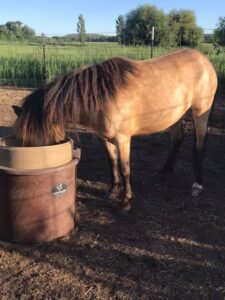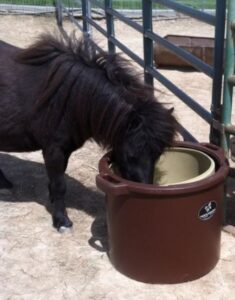Porta-Grazer can help maintain your horses weight

Maintaining your horses weight
All horses require forage 24/7 regardless of size or breed. Horses do not have a gall bladder so the stomach acid runs 24/7. When no forage is available the stomach acid builds up with no way for the horse to buffer it. Which can lead to Ulcers and Bad Stall Habits such as wood chewing, pawing, and more.
A lot of people say some horses or certain breeds are "easy keepers" or "piggy eaters". So they try to reduce the amount of hay in an effort to maintain the weight. When you ration out small amounts of hay a few times a day to limit the calorie intake this creates a feast and famine routine for the horse. The stomach acid builds between the "meals". Therefor, they tend to be more aggressive eaters when you bring a portion of hay. All they are trying to do buffer that stomach acid.
How to free feed without weight gain
So how do you maintain your horses weight, while still giving them the amount of forage their digestive system needs?
By regulating the calories IN the hay.
At first, when introducing your horse to free feeding they may seem to spend nearly all their time at the feeder. However, once the novelty of the all-you-can-eat buffet wears off, a normal horse will reduce its hay consumption to an amount needed to maintain a normal body condition.
Horses with a higher work load usually require more calorie intake than a horse that has a more "relaxed" life style. However, both types still need forage available 24/7 in order to keep their digestive system working properly and to prevent ulcers.
By free feeding a low calorie type hay such as timothy or teff you can meet the horses digestive needs, without the excess calories they don't need. You are spreading the same amount of calories over a longer period. A higher calorie hay can be used for those that need more calories while maintaining a low calorie hay for the ones who don't need extra calories.
If weight gain or insulin resistance / laminitis is a concern, have the hay analyzed for sugar and starch content. (It should be less than 10%).
Is your horse "fat" or has a "hay belly"? Here is a great article by Juliet Getty PhD- Does a Hay Belly Mean My Horse is Fat?
What if my horse can only have pellets?
Horses that cannot chew hay for whatever reason can still be free fed by using low calorie type grass hay pellets. The pellet pan only allows a few pellets at a time to come to the top. This allows the horse the ability to have plenty of chew time while still maintaining their weight.
Related topics you may find helpful
Forage deprivation can make your horse stay fat.
For example- A mini requires very little in the way of calories. They seem to get fat just by breathing air. Yet their digestive system still works the same as a larger breed horse. By providing a low calorie hay even these pint size horses can still graze all day and night and maintain their proper weight.

How using a Porta-Grazer helps
By using a Porta-Grazer it allows the horse to control the size of his bites. Same as in pasture. The rotating pan lifts and holds bits of hay up to the horse so it can size and tear of each bite. Ample saliva is mixed with the forage as it is chewed. When thoroughly salivated forage enters the stomach it begins to buffer the painful stomach acid. Which balances the pH and creates comfort. When the pH is in balance he will quit eating until the acid builds up again. Then he will eat to bring it back to balance. That is the grazing routine you see when horses graze mature pasture.
Feeds that are high in sugar (grains for example) interfere with the pH balancing process.
